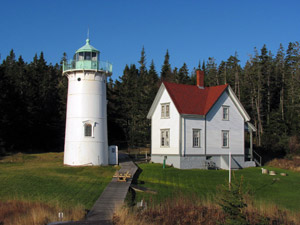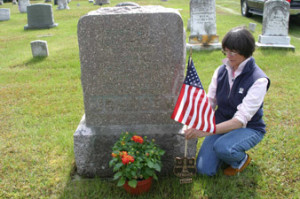
Close up view of the rare United States Lighthouse Establishment oil can donated by Delia Farris to the Friends of Little River Lighthouse. (Photo by Kathleen Finnegan.)
An extremely rare oil measuring container with the words “U.S. Light House Establishment” on it has been donated to the Friends of Little River Lighthouse in Cutler, Maine, by Delia Farris, also of Cutler.
Delia said the oil can has been in her family’s possession for many years. With the recent dedication of the Lighthouse Service Veteran’s grave markers at the gravesites of her great grandfather, Roscoe Johnson, and her grandfather, Willie W. Corbett, both who served as lighthouse keepers at Little River Lighthouse, the time was right to donate the artifact to the lighthouse.
Although the container is small, only 3 inches high by 2 ¼ inches in diameter, it is extremely rare, said Tim Harrison, president and founder of the Friends of Little River Lighthouse. He went on to explain that in the early 1900s the name United States Lighthouse Service began to creep into use, replacing the name of the United States Lighthouse Establishment. In 1910 the word Establishment was dropped altogether when the U.S. Light-House Board was dissolved by Congress and the U.S. Bureau of Lighthouses was formed, which then was commonly referred to as the U.S. Lighthouse Service.

Little River Light Station (Photo by Bob Trapani, Jr.)
Jim Claflin of Kendrick Claflin and Son Nautical Antiques said the small metal can with the brass plate affixed to it dates to the 1870s or earlier, and future cans of this type were made of brass. He said, “This can was part of a set of oil measurement containers used to measure the quantity of oil used in the lamps that lit the lens in the tower in the days before electricity.”
Harrison said that when the government started using brass cans, the name of the U.S. Lighthouse Service was engraved on the bottom of the cans, and the older cans of this type were generally discarded. Then in 1939, when the U.S. Lighthouse Service was dissolved and its duties were assumed by the Coast Guard, most of the items that said U.S. Lighthouse Service were discarded or deliberately destroyed by the government. “Those that survived were generally those that the lighthouse keepers, for whatever reason, simply kept for themselves.”
“Because we can come pretty close to aging the can,” said Harrison, “since it took the government a great length of time to replace these cans with brass cans, especially at remote lighthouses like those in eastern Maine, it was most likely used by Roscoe Johnson when he was the keeper at Little River Lighthouse from 1896 to 1898, or at Libby Island Lighthouse, in Machias Bay, where he was the lighthouse keeper from 1894 to 1896 and again from 1898 to 1901. When the item was replaced, he probably simply kept the old one, perhaps to use, or as a souvenir.”

Delia Farris at the grave site of her great-grandfather Roscoe Johnson who was a lighthouse keeper at Libby Island Lighthouse in Machias Bay and Little River Lighthouse in Cutler. (Photograph by Kathleen Finnegan.)
Interestingly, Johnson’s son-in-law, Willie W. Corbett, was also the keeper at Little River Lighthouse in Cutler from 1921 to 1945. Many of the descendents of Johnson and Corbett are now involved with the Friends of Little River Lighthouse, which is a chapter of the American Lighthouse Foundation, the nonprofit group that owns the lighthouse.
Delia Farris said she is proud of her family’s lighthouse heritage and is honored that this artifact is now in the possession of the Friends group for everyone to enjoy.
Little River Lighthouse, on a small island in Cutler Harbor, was once listed by Maine Preservation as one of Maine’s Ten Most Endangered Historic Properties. In 2000 a restoration effort was launched by Tim Harrison to save and restore the lighthouse that is now open to the public for overnight stays, with caretakers living on the island to manage the property.
The lighthouse will host three Open Houses for the public this summer: July 16, July 30, and August 13. Boats will depart Cutler Harbor for the island at 10am on each of those dates, weather permitting. For more information, you can visit their web site at www.LittleRiverLight.org or call them at 207-259-3833.

